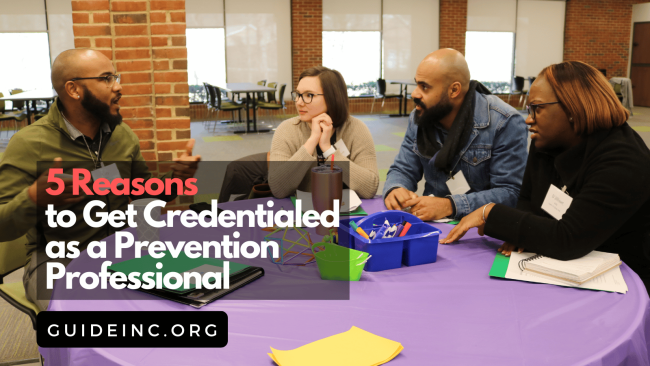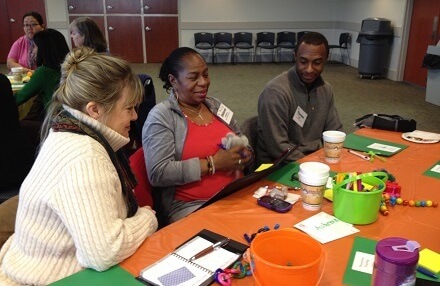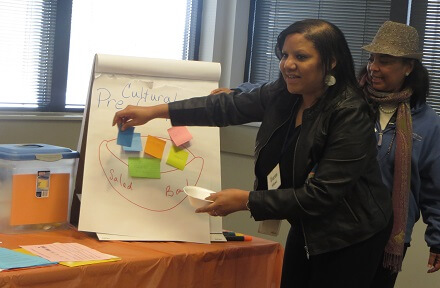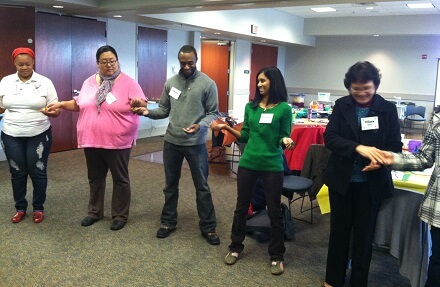
Decades ago, a group of prevention workers got together to investigate the pros and cons of instituting a prevention credentialing process in Georgia. The field of substance abuse prevention was still in its adolescence, but growing. Many of those who started working in prevention came from the treatment, health education and social work professions, all of which required licensure or credentialing. This group believed there was a need to move from working in prevention to becoming a prevention professional with high standards for ethical practice and a broad range of knowledge and skills. They researched how other states and organizations provided prevention credentialing and, from this research, the Prevention Credentialing Consortium of Georgia (PCCG) began.

So, why should you pursue your credential as a Prevention Apprentice, Certified Preventionist or Internationally Certified Prevention Specialist? If you engage in this process, you will:
- Gain an understanding of prevention history and underlying theories to inform practice today. In the past, a majority of those working in the prevention field were trained to facilitate a program, usually in schools. Today, however, there is much more to substance abuse prevention than this. In order to engage in meaningful strategic planning, prevention professionals must have a solid base of prevention history and theories of behavioral change. The core courses required by PCCG provide that base of information.
 Become a lifelong learner of the latest and greatest in prevention. Quality prevention services require a well-trained workforce that is educated and skilled in providing services that are evidence-based, appropriate and effective. The continuing education requirement for new PCCG credentialing and recertification ensures that prevention professionals are keeping abreast of new research findings, trends and strategies and may even lead to opportunities for career enhancement.
Become a lifelong learner of the latest and greatest in prevention. Quality prevention services require a well-trained workforce that is educated and skilled in providing services that are evidence-based, appropriate and effective. The continuing education requirement for new PCCG credentialing and recertification ensures that prevention professionals are keeping abreast of new research findings, trends and strategies and may even lead to opportunities for career enhancement.- Be protected by the PCCG Code of Ethical Conduct. The prevention field, including providers and service recipients, should be protected from any form of professional misconduct or unethical behavior such as discrimination, violations of confidentiality, conflicts of interest or misappropriation of funding. The Code of Ethical Conduct adopted by PCCG provides the basic tenets of ethical and professional conduct and are guided by core values and competencies that have emerged with the development of the prevention field.
- Network with other prevention professionals. Participating in the four core courses required for prevention credentialing in Georgia provides excellent opportunities for networking with other professionals in the field. This networking can result in exchanges of information about a variety of strategies and approaches, builds partnerships for tackling challenging issues and very often results in long-lived friendships.
- Establish your career in the field of prevention. Last, but not least…credentialing moves you from having a job in prevention to becoming a professional with a career in an important, life-changing field of endeavor. Treatment and recovery services are certainly important, however, a skilled workforce of prevention professionals throughout Georgia means that countless numbers of young people will never face the anguish of addiction. Prevention works, but it requires a legion of competent professionals to make that happen. Become one of these professionals; get credentialed!
 If you are working towards your credential, we have upcoming Prevention Trainings. Attend one or attend them all! Courses include: Fundamentals of Prevention, Ethics in the Prevention Field, Cultural Competency for the Prevention Professional and Communication Skills for the Prevention Professional. For more information about courses and registration, please click here. We hope to see you soon!
If you are working towards your credential, we have upcoming Prevention Trainings. Attend one or attend them all! Courses include: Fundamentals of Prevention, Ethics in the Prevention Field, Cultural Competency for the Prevention Professional and Communication Skills for the Prevention Professional. For more information about courses and registration, please click here. We hope to see you soon!
A special thank you to Ari Russell, GUIDE’s Founding Executive Director, for contributing this piece.
